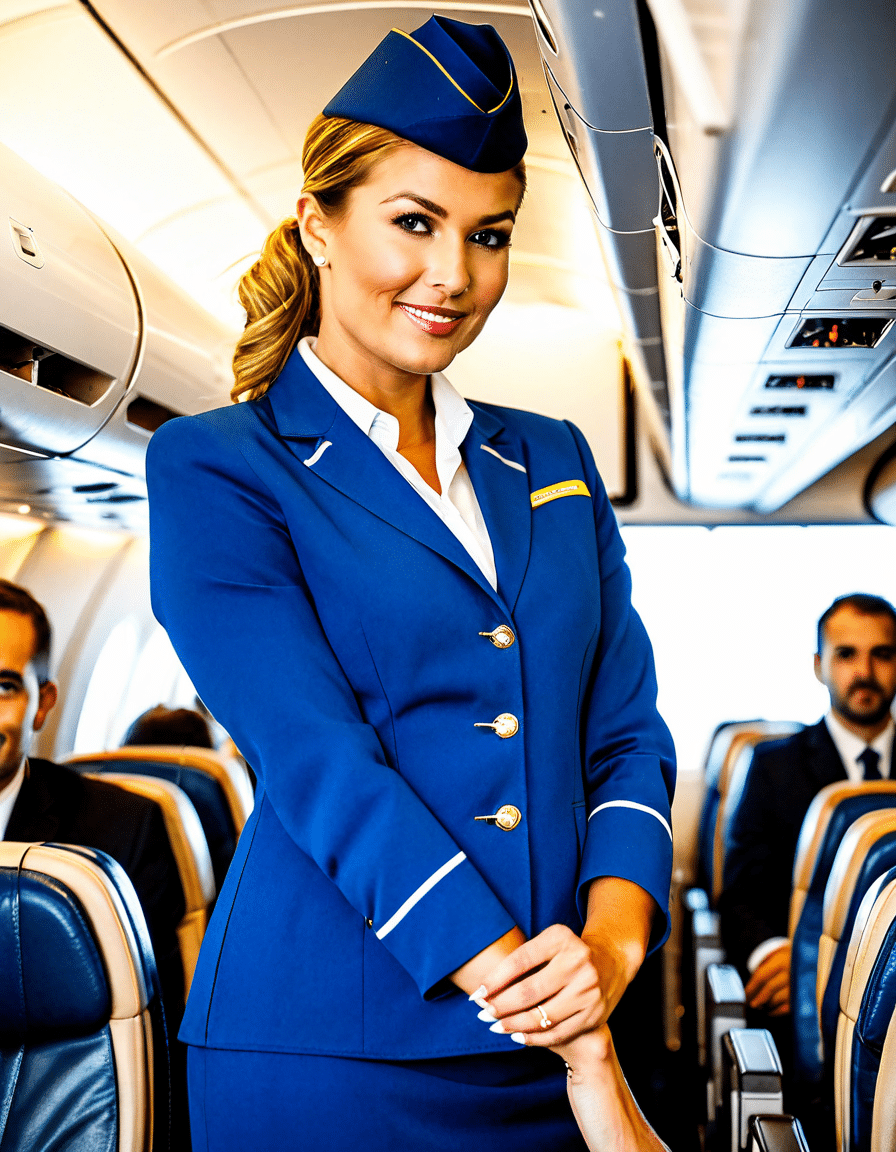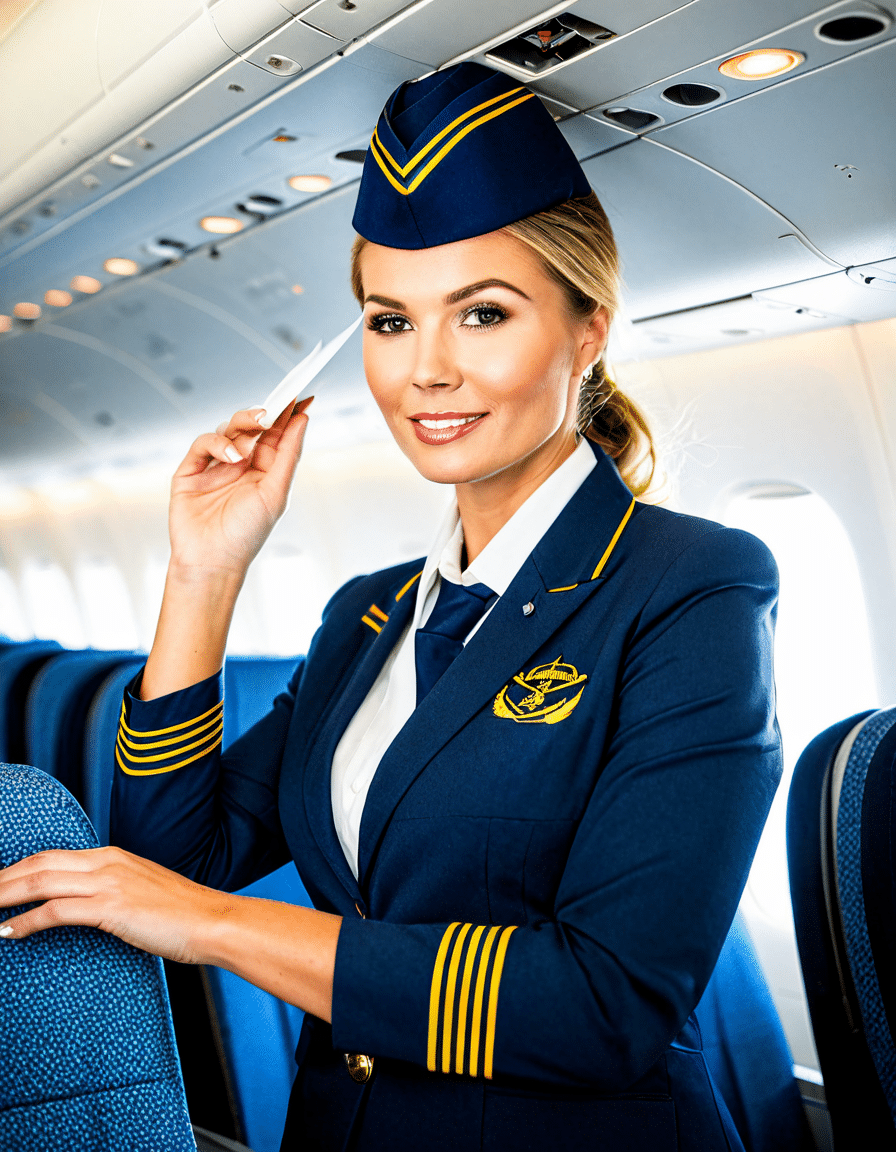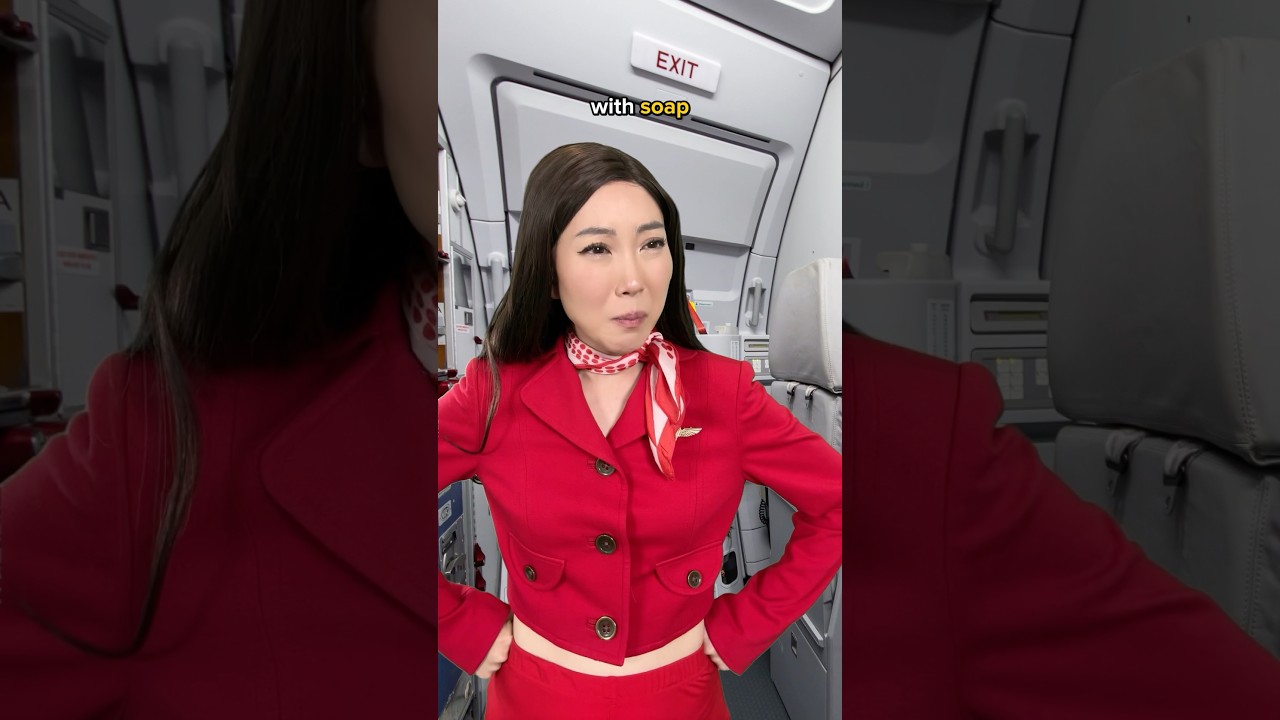
The Secrets Behind Flight Attendant Careers: Inside the Glamour and Grit

1. Flight Attendant: A Day in the Life of an Airborne Professional
When people think about a flight attendant, they often picture someone strutting down the aisle with a bright smile and a cart full of snacks. Let’s clear the air: being a flight attendant is far from just serving beverages at 30,000 feet! Sure, there’s a bit of glamour, but underneath that friendly exterior lies a world of challenges. These airborne professionals handle emergencies, ensure passenger safety, and manage a schedule that can change faster than turbulence hits.
Did you know that flight attendants typically spend around 75 hours in the air each month? But that’s not the full story. This doesn’t account for the countless hours spent on the ground prepping for flights. Picture this: a flight attendant is prepping the cabin while juggling customer service issues, ensuring every passenger feels cared for — talk about multi-tasking! They’re like the Swiss Army knife of aviation.
On a given day, they might face anything from a toddler who’s had a bit too much sugar to someone who thinks they can order a five-course meal mid-flight. And let’s not even start on those passengers who think they’re entitled to an upgrade just because they said “please” with a wink! Being a flight attendant isn’t just about looking good; it’s about being a problem-solver, a confidante, and sometimes, even a bouncer at a police station when tensions rise.

2. Top 7 Skills Every Flight Attendant Needs to Succeed
Now, you might wonder, what does it take to thrive in this bustling airborne life? Let’s break down the top seven skills that every flight attendant must master to climb the career ladder.
Clear communication is critical! Flight attendants must convey safety instructions succinctly, especially in emergencies. Moreover, managing expectations with passengers can mean the difference between a delightful flight and an airborne nightmare.
In flight, crises feel like tremors on a rollercoaster. A flight attendant’s ability to stay calm and act fast is crucial. Think of them as first responders trained in all sorts of emergencies — from turbulent skies to medical situations.
Interacting with passengers from diverse backgrounds is a daily affair. Cultural sensitivity helps flight attendants cater to everyone’s needs and resolve conflicts before they escalate.
In a world where airlines are increasingly relying on onboard sales, having a flair for selling merchandise can fatten an attendant’s paycheck. Who knew selling headsets could become a ticket to a dark tower movie marathon at home?
The relationship between flight attendants and pilots is akin to that of a well-coordinated football team. Great teamwork ensures that everything runs smoothly — even when the skies get a little bumpy.
Hours on their feet and the demanding nature of emergency evacuations require flight attendants to stay fit. Staying healthy is a must in their line of work.
Dealing with constant stress can wear you down. Just like recruits at a police academy, many flight attendants undergo rigorous training to bolster their mental strength, enabling them to tackle passenger confrontations with grace.

3. The Unsung Challenges Faced by Flight Attendants
Don’t let those trendy uniforms fool you; life in the skies has its fair share of challenges. Difficult passengers, unpredictable schedules, and ever-changing work environments are part of the job. The fluctuations in the airline industry, particularly as we climb out of the pandemic, have shaken the boat — leaving many flight attendants feeling a bit uneasy about job security.
Research highlights that approximately 75% of flight attendants have faced stressful issues related to passenger behavior. Picture a police officer encountering intense altercations, and you’ll get a sense of their day-to-day. Instances of in-flight disruptions have surged, demanding that attendants rely more heavily on their rigorous training to keep the peace.
Furthermore, these brave souls have to juggle the demands of the airline with their personal lives, which often resembles a game of Oregon football — fast-paced and occasionally unpredictable! Finding a balance can be challenging, but the unwavering commitment to passenger safety keeps them grounded.

4. Oregon Football of Flight Attendants: How Regional Airlines Are Shaping Careers
As air travel continues to evolve, regional airlines like Horizon Air and Alaska Airlines have stepped into the spotlight, much like the rising stars of Oregon football. These airlines create unique career paths where flight attendants can advance quickly and gain extensive experience, often face-to-face with seasoned professionals.
Horizon Air has launched a “Flight Attendant Ambassador Program” where new hires have the chance to shadow experienced crew members. Imagine the bonus of learning the ropes directly from those who’ve weathered it all! This type of mentorship fosters valuable insights into airline operations, helping young attendants feel their way through the skies.
The regional airline experience can shape careers like nothing else. Those who start at Horizon or Alaska often find opportunities elsewhere or develop specialized skills that lead to advancement within the airline, creating a network akin to a winning football team.
5. What Lies Ahead: The Evolving Role of Flight Attendants in 2026
As we zoom into 2026, the role of flight attendants is on the brink of another transformation, driven by tech and shifting traveler desires. Automated services are popping up everywhere, suggesting that customer engagement will see a significant upgrade. Think of it as elevating the flight experience to a hotel-like level — they’ll soon be focusing on personalized service and better customer experiences.
Recently, airlines are experimenting with tech, potentially paving the way for flight attendants to manage mobile apps that gather real-time passenger feedback. Sounds a bit like a scene out of a futuristic Cabrini movie, right? This shift will redefine their responsibilities while enhancing interaction with guests.
In wrapping this up, flight attendants are vital to the commercial aviation scene. They fuse professionalism with adaptability and emotional savvy, all while being a friendly face at cruising altitude. From ground training to soaring through the clouds, their stories are compelling, showcasing their resilience and passion. As they venture into the future, expect them to remain at the front of air travel, just like star players in every championship season!
Whether you’re flying high soon or just dreaming of a trip, remember these amazing individuals keeping the skies friendly and safe. Next time you board, give a little wave to the crew — after all, they might just spend their evening catching up on the batman Begins cast instead of napping!
Flight Attendant Secrets Behind Their Stunning Careers
The Glamour and Grit
The role of a flight attendant might seem glamorous, but there’s an intricate tapestry of skills and experiences that make up their career. Many folks are surprised to learn that becoming a flight attendant requires a unique blend of human Resources training and interpersonal skills. After all, they’re not just serving snacks; they’re responsible for passengers’ safety and comfort throughout the flight. You can’t underestimate how essential it is for flight attendants to manage challenging situations, which is exactly why they’re often trained in conflict resolution and emergency procedures. It’s a bit like a dark tower movie—full of unexpected twists and turns!
A Day in the Life
Ever wonder what it feels like to work routes like from Oak Creek, WI to Milwaukee, WI? Flight attendants can experience vastly different workdays; one day they might be flying a short domestic route, and the next, they could be heading across the globe. Each flight brings new faces and new stories, allowing flight attendants to explore cultures and places without ever leaving their cabins. Interestingly, some flight attendants find that downtime is perfect for learning things like the latest gossip, like the ongoing saga of Mike Perry Vs Jake paul, or just indulging in some good old-fashioned fiction, like Robin Hood.
Beyond the Cabin
Flight attendants often face multiple challenges while at cruising altitude, including fatigue from bent schedules and the effects of pressurized cabins. It might surprise you to learn that many flight attendants report high job satisfaction due to the lifestyle perks, travel opportunities, and camaraderie among crews. Of course, they’ve got to be adaptable and ready for anything, just like an invaluable tax tip—understanding if property taxes are included in a mortgage can save you from nasty surprises later! This career definitely isn’t for the faint-hearted, but those who thrive in this environment often find it to be as thrilling as a dramatic in-flight movie.

How do I become a flight attendant?
To become a flight attendant, you typically need to meet certain qualifications like having a high school diploma or GED, being fluent in English, and having good customer service skills. Most airlines provide training programs, and many prefer candidates with previous hospitality experience.
Do flight attendants make good money?
Flight attendants can earn a decent salary, which often includes base pay plus additional compensation for hours worked, bonuses, and per diem for meals while traveling. Entry-level salaries vary by airline, but they can make a comfortable living, especially with tips and overtime.
Why was flight attendant cancelled?
The TV series “Flight Attendant” was cancelled due to a mix of creative decisions and audience reception. These things happen sometimes in the entertainment world.
How much do flight attendants pay?
Flight attendants do have to pay for things like their uniforms and certain training costs, but these expenses can vary widely based on the airline and their policies.
How much do flight attendants make?
On average, flight attendants can make anywhere from $30,000 to $60,000 in their first few years, with experienced individuals earning more. Airlines often have different pay structures that reflect years of service and additional responsibilities.
Is it very hard to become a flight attendant?
While it’s not usually extremely difficult to become a flight attendant, the process can be competitive. Candidates must pass interviews, training, and comply with specific regulations.
Do flight attendants go home every night?
Flight attendants don’t always go home every night. They often work on trips that can last several days, staying in different cities before returning home.
Do flight attendants travel for free?
Yes, flight attendants typically get to travel for free or at a greatly reduced price when flying on their airline or sometimes on partner airlines. It’s a nice perk of the job!
Who pays their flight attendants the most?
Airlines like Delta, Southwest, and United are known for offering competitive salaries, but pay can depend on various factors like location and experience level.
How often do flight attendants get off?
Flight attendants usually get about 10 to 15 days off a month, but this varies depending on the airline and their specific schedule.
Why couldn’t flight attendants be married?
In the past, some airlines had policies against married flight attendants, often due to old-fashioned views about job commitments. Nowadays, those policies have mostly changed.
Is the flight attendant for a girl only?
Flight attendants aren’t just for girls; the profession is open to anyone who meets the qualifications, regardless of gender.
Do flight attendants work 40 hours a week?
Most flight attendants work between 75 to 100 hours a month, which doesn’t equate to the typical 40-hour work week because their hours can be irregular and spread out over several days.
Is there a weight requirement for flight attendants?
There’s no strict weight requirement for flight attendants, but many airlines have guidelines to ensure employees can perform essential duties, like reaching overhead compartments and moving around the cabin easily.
How much will I make my first year as a flight attendant?
In your first year as a flight attendant, you can expect to make around $30,000 to $50,000, depending on the airline and how many hours you work.
How long can it take to become a flight attendant?
It can take anywhere from a few weeks to several months to become a flight attendant, depending on the training program and when you get hired.
What qualifications do you need to be a flight attendant?
The basic qualifications include being at least 18 years old, having a high school diploma, and being able to pass a background check and drug test. Many airlines also look for good interpersonal skills.
Do flight attendants get free flights?
Yes, flight attendants generally get free flights, which is one of the highlights of the job, but they may have to fly standby, meaning they can only board if there are available seats.
How expensive is it to become a flight attendant?
The cost of becoming a flight attendant can vary, but it includes things like training programs, uniforms, and initial travel expenses. It can range from a few hundred to several thousand dollars, depending on the airline and training options chosen.






















